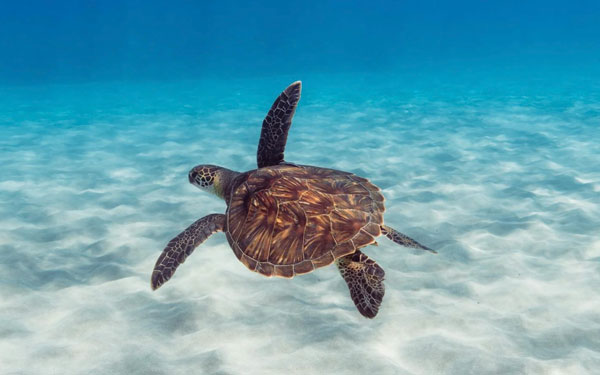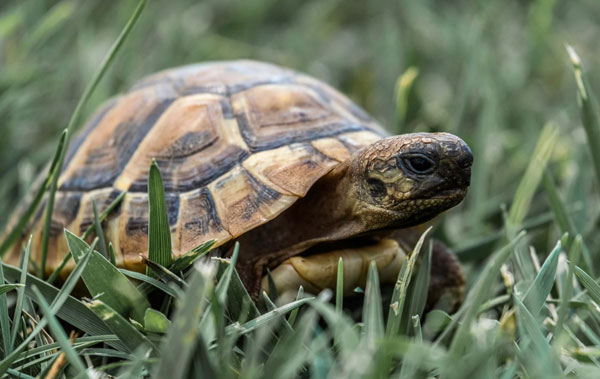How Long Can Turtles Go Without Eating?
Turtles are fascinating creatures that can survive in various conditions. However, one common question that intrigues turtle owners and wildlife enthusiasts alike is, “How long can turtles go without eating?” This article will delve into this topic, uncovering survival mechanisms in both wild and pet turtles, tips for feeding your turtle while on vacation, and reasons turtles may stop eating.

How Long Can a Wild Turtle Live without Food?
Wild turtles have evolved to endure extreme conditions. Their ability to survive without food for extended periods is part of their natural resilience: Wild turtles can survive up to several weeks without food. This is largely due to their slow metabolism which helps conserve energy.

Let’s check other reasons that my affect wild turtle’s feeding:
Seasonal changes often dictate a turtle’s feeding habits. For instance, during winter hibernation, turtles can go months without eating.
Habitat plays a crucial role. Turtles in resource-rich environments typically have more consistent access to food.
Food scarcity in the wild can naturally reduce turtles’ feeding frequency. Body size and species are also determinants. Larger species may have more fat reserves and thus can last longer.
Hydration is more critical than food. A turtle can survive longer without food than without water.
However, prolonged deprivation can weaken the turtle’s immune system and make it susceptible to diseases.
While survival without food is remarkable, access to nutrition remains vital for a turtle’s long-term health and reproduction.
How Long Can a Pet Turtle Go Without Eating?
Pet turtles, being in a controlled environment, generally have more stable feeding routines. Yet, certain situations might lead owners to question how long their turtles can endure without food: Pet turtles can typically go 1-2 weeks without eating, provided they have adequate water.
Here are various factors influencing this duration, including age, species, and health status.
Young turtles, unlike adults, need more frequent feeding due to their rapid growth phase.
Water temperature is pivotal. Colder temperatures can slow metabolism, allowing turtles to survive longer without food.
Stress factors, such as changes in environment or handling, can impact their appetite.
Consistent clean water is essential. Dehydrated turtles can’t efficiently process what little energy reserves they have.
Overfeeding can lead to obesity-related health issues, so routine fasting occasionally can be beneficial.
If your turtle isn’t eating, monitor for illness or environmental changes and consult a reptile vet if concerned.
How to Feed Your Turtle While on Vacation?
Leaving your pet turtle alone while on vacation may seem daunting, but there are effective strategies to ensure they remain well-fed:
Automatic Feeder:
Invest in a quality automatic turtle feeder that dispenses food at preset intervals. Ensure the feeder is compatible with the type and size of turtle food.
Test the feeder several days before leaving to ensure proper functioning.
Adjust the quantity to prevent overfeeding, which can cloud the water.
Tankmate Buddy:
Arrange for someone trustworthy to check in and feed your turtle.
Provide detailed instructions and a feeding schedule.
Show them how to check the water quality and temperature.
Leave a list of emergency contacts, including your vet’s number.
Vacation Feeder Blocks:
They dissolve slowly, releasing food over several days.
Choose one formulated for turtles.
Ensure your turtle can eat the blocks and doesn’t reject them.
Monitor for the first few hours to ensure it’s working correctly.
Fasting:
For short vacations (2-3 days), healthy adult turtles might manage a short fast.
Ensure the water is clean and at the correct temperature.
Return promptly to resume regular feeding.
Consult your vet if your turtle has specific dietary needs or health concerns before deciding on this option.
Reasons Turtles May Stop Eating
Turtles sometimes refuse food due to several reasons:
Environmental Stress:
Changes in habitat or water quality can disrupt their routine.
Sudden shifts in temperature or water pH can cause stress and appetite loss.
Ensure your tank setup mimics their natural environment as closely as possible.
Regularly clean the tank and maintain optimal water conditions.
Health Issues:
Illness, infections, or parasites can make eating uncomfortable or impossible.
Look for signs of illness like lethargy, discoloration, or unusual behavior.
Keep a close eye on their physical health and consult a vet if you notice abnormalities.
Regular health checks and a balanced diet can prevent many common health issues.
Seasonal Changes:
Turtles may eat less when preparing for hibernation.
Recognize the species-specific hibernation patterns.
Adjust feeding schedules based on their natural cycle.
Ensure they are in good health before hibernation to survive the fasting period.
Diet Boredom:
Repetitive diets can lead to disinterest.
Rotate their food variety to maintain their interest.
Provide a balanced mix of commercial turtle food, vegetables, and occasional live food.
Introduce new food items gradually to avoid digestive issues.
Conclusion
Understanding how long turtles can go without eating and the reasons behind it can help turtle owners better care for their pets. While wild turtles have evolved to endure prolonged fasting periods, pet turtles depend on us for their well-being and must not be left unfed for too long. Prepare adequately if planning a vacation and always ensure your turtle’s environment is stress-free and healthy.
FAQs
Can a turtle go a week without food?
Yes, many adult turtles can go a week without food, provided they have access to clean water and are healthy.
How often should I feed my turtle?
Feed your turtle every day if it’s young and growing, typically under 6 months old. As they mature, reduce feeding to every other day. Adult turtles can be fed 3-4 times a week.
What happens if turtles don’t eat?
If turtles don’t eat for extended periods, they can become weak and susceptible to illnesses. It’s crucial to identify and address the underlying cause quickly.
